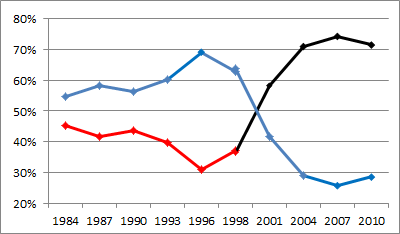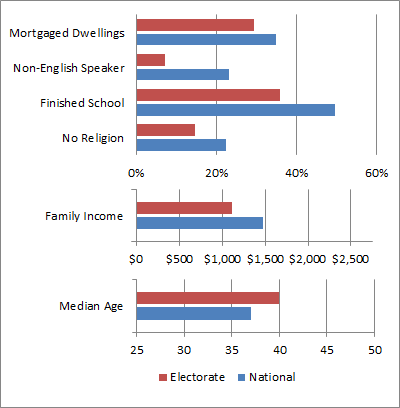UPDATE (29/4/13): Essential Research is perfectly unchanged for the second week in a row, with Labor on 34%, the Coalition on 48% and the Greens on 9%, with the Coalition lead at 55-45. It finds a seven point drop since last June in respondents who think the economy is heading in the right direction, to 36%, and has 38% expecting the budget to be bad for them personally against 12% good and 38% neutral. Respondents were also asked about preferred revenue-raising measures, with “higher taxes for corporations” towering above the pack on 64%. Reducing tax breaks for higher income earners was net positive (45% approve, 38% disapprove), but reductions in the baby bonus and family tax and any spending cuts were rated negatively. It was also found that 45% believed population growth too fast, 37% about right and only 5% too slow.
New England was created at federation and has changed remarkably little since, at all times accommodating Armidale and Tamworth and losing Glen Innes only between 1934 and 1949. Currently the electorate sits inland of the north coast seats of Richmond, Cowper and Lyne, extending southwards from the local government areas of Tenterfield and Inverell on the Queensland border through Glen Innes and Armidale to Tamworth, Gunnedah and Walcha. Tony Windsor has been the seat’s independent member since 2001, when he ended an uninterrupted run of National/Country Party control going back to 1922.
Windsor came to politics from a background as a local farmer and economist, winning the state seat of Tamworth as an independent in 1991 after unsuccessfully seeking preselection to succeed a retiring Nationals member. Windsor had received the support of seven out of nine local party branches, and his defeat prompted a revolt among local members of the Nationals as well as the Liberal Party, which did not field a candidate at the election. He went on to win election with 36.2% of the primary vote to 31.9% for the Nationals candidate, prevailing by 9.8% after preferences. Windsor’s victory gave him an early taste of life as an independent in a hung parliament, Nick Greiner’s Coalition government having lost its majority at the election. Windsor was at first the most accommodating of the independents in shoring up Greiner’s position in parliament, but he would join the others in forcing Greiner’s resignation following an adverse ICAC finding in June 1992. Windsor polled 82.2% of the primary vote in the absence of Nationals or Liberal candidates in 1995, which came down to 69.4% when the Nationals fielded a candidate in 1999.
Windsor announced his intention to contest New England two months out from the 2001 federal election, having also floated the idea of running against then Nationals leader John Anderson in the neighbouring seat of Gwydir. He duly recorded 45.0% of the primary vote against 38.9% for Nationals incumbent Stuart St Clair, who had come to the seat in 1998 in succession to retiring former party leader Ian Sinclair, and prevailed by 8.3% after preferences. Windsor’s primary vote would swell to 57.3% in 2004 and to 61.9% at consecutive elections in 2007 and 2010. Windsor’s testy relationship with the Nationals worsened in the lead-up to the 2004 election when he claimed he had been offered a sinecure if he agreed to quit politics, telling parliament a few months later that the offer was communicated to him by a Tamworth businessman acting at the behest of John Anderson and Nationals Senator Sandy Macdonald. This was denied by all concerned, including the businessman.
Household name status awaited Windsor after the 2010 election left him and four other cross-benchers holding the balance of power. With independent Andrew Wilkie and Adam Bandt of the Greens declaring early for Labor, Julia Gillard needed the support of two of the three remaining independents to achieve a majority. Each represented electorates that were rural and broadly conservative, especially in Windsor’s case. It was thus an especially bold move on Windsor’s part to join with Lyne MP Rob Oakeshott in throwing their lot in with Labor. All indications since have been that Windsor and Oakeshott have paid a high political price for their decision, in contrast to Kennedy MP Bob Katter who cagily declared for the Coalition as the Windsor-Oakeshott deal made his vote redundant. A Newspoll survey of 500 voters in October 2011 had Windsor trailing the Nationals 41% to 33% on the primary vote and 53-47 on respondent-allocated preferences. In June 2012, at which time it was anticipated Richard Torbay would be the Nationals candidate, a ReachTEL poll of 532 respondents 532 respondents gave Torbay a primary vote lead of 62% to 25%.
Richard Torbay’s name first emerged as a possible Nationals candidate in mid-2011, though it was said at the time that this was conditional on Windsor retiring. Torbay had been an independent member for the state parliament since 1999, when he unseated Nationals member Ray Chappell in the Armidale-based seat of Northern Tablelands. Torbay’s primary vote progressed from 44.2% to 71.3% in 2003 and 72.7% in 2007, before falling back to 63.4%. In the wake of the latter result Torbay complained of “the trashing of the independent brand”, which was easy to interpret as a dig at Windsor and Oakeshott. He also revealed at this time that he had been approached to run for New England by the Liberals and Katter’s Australian Party as well as the Nationals, and that he was taking very seriously the offer from the latter. His intention was confirmed in mid-2012, when the party granting him “freedom to speak with an independent voice on local issues”.
Torbay’s ambitions became rapidly unstuck in March 2013 when the Financial Review reported he had received assistance from embattled Labor operative Eddie Obeid ahead of his run for state parliament in 1999. Over the next two days Torbay withdrew as candidate and resigned as member for Northern Tablelands, with Nationals state chairman saying the party had received unspecified information “of which we were not previously aware”. This information was referred to ICAC, which raided Torbay’s home and electorate office the following week. Torbay’s loss proved a gain for Barnaby Joyce, who had emerged as the Nationals’ most visible figure since his election to the Senate in 2004 and was widely thought a more promising candidate for the party leadership than low-profile incumbent Warren Truss. Joyce had been open in his desire to move to the lower house, and nominated New England, where he had been born and raised, as his second favoured entry point after the Queensland rural seat of Maranoa.
Not all within the NSW Nationals were quite so keen on furnishing the nominal outsider with what had traditionally been a stronghold seat for the party. In 2011 his opponents sounded out the party’s state leader, Deputy Premier Andrew Stoner, with a view to stonewalling Joyce by contesting the seat and assuming the federal party leadership. Stoner said he wasn’t interested, and the Torbay option would firm in its stead after party polling in early 2012 showed he offered the clearest path to victory over Windsor, including in comparison with Joyce. Thwarted in Maranoa by incumbent Bruce Scott’s determination to serve another term, Joyce reconciled himself for the time being to continue serving in the Senate. When Torbay withdrew Joyce was quick to reiterate his interest, although there were suggestions he might have a strong preselection opponent in the shape of Nationals Farmers Federation president Alexander “Jock” Laurie. However, Laurie instead chose to run in the state by-election to replace Torbay in Northern Tablelands, and Joyce went to an easy 150-10 win in the local preselection vote over Tamworth IT businessman David Gregory.









Crikey is committed to hosting lively discussions. Help us keep the conversation useful, interesting and welcoming. We aim to publish comments quickly in the interest of promoting robust conversation, but we’re a small team and we deploy filters to protect against legal risk. Occasionally your comment may be held up while we review, but we’re working as fast as we can to keep the conversation rolling.
The Crikey comment section is members-only content. Please subscribe to leave a comment.
The Crikey comment section is members-only content. Please login to leave a comment.